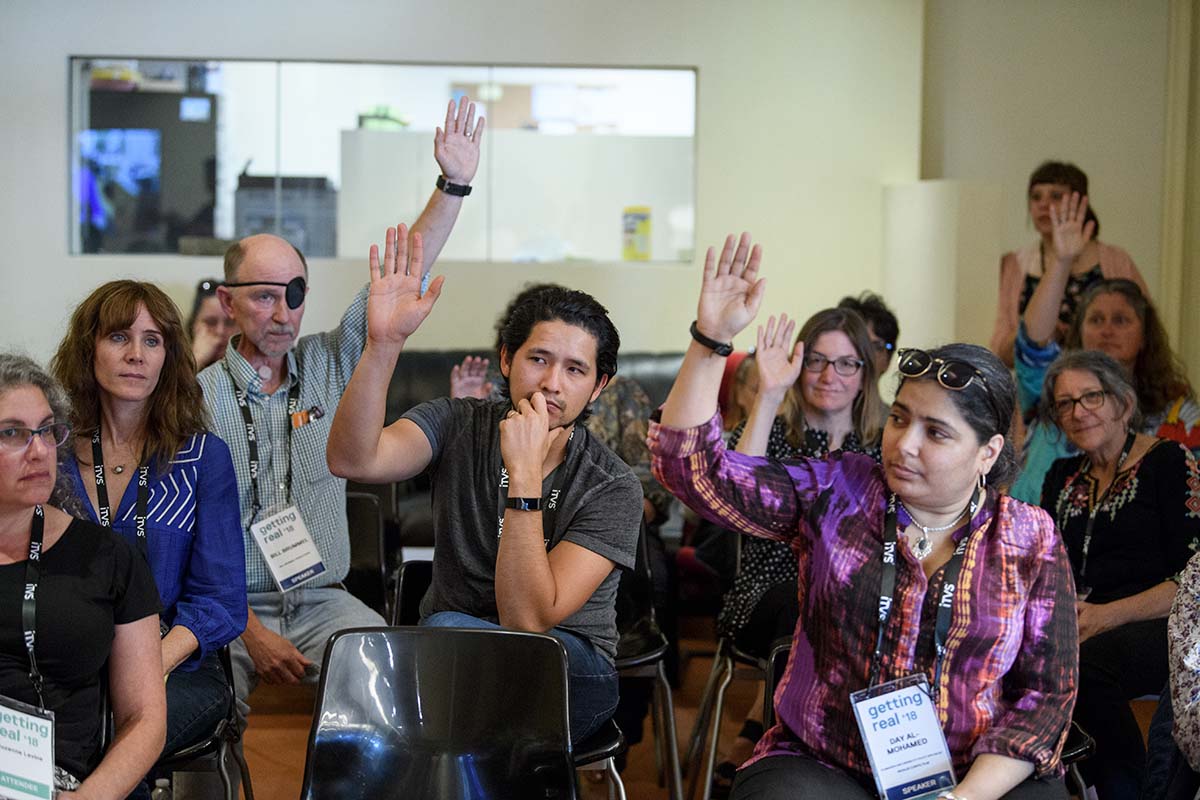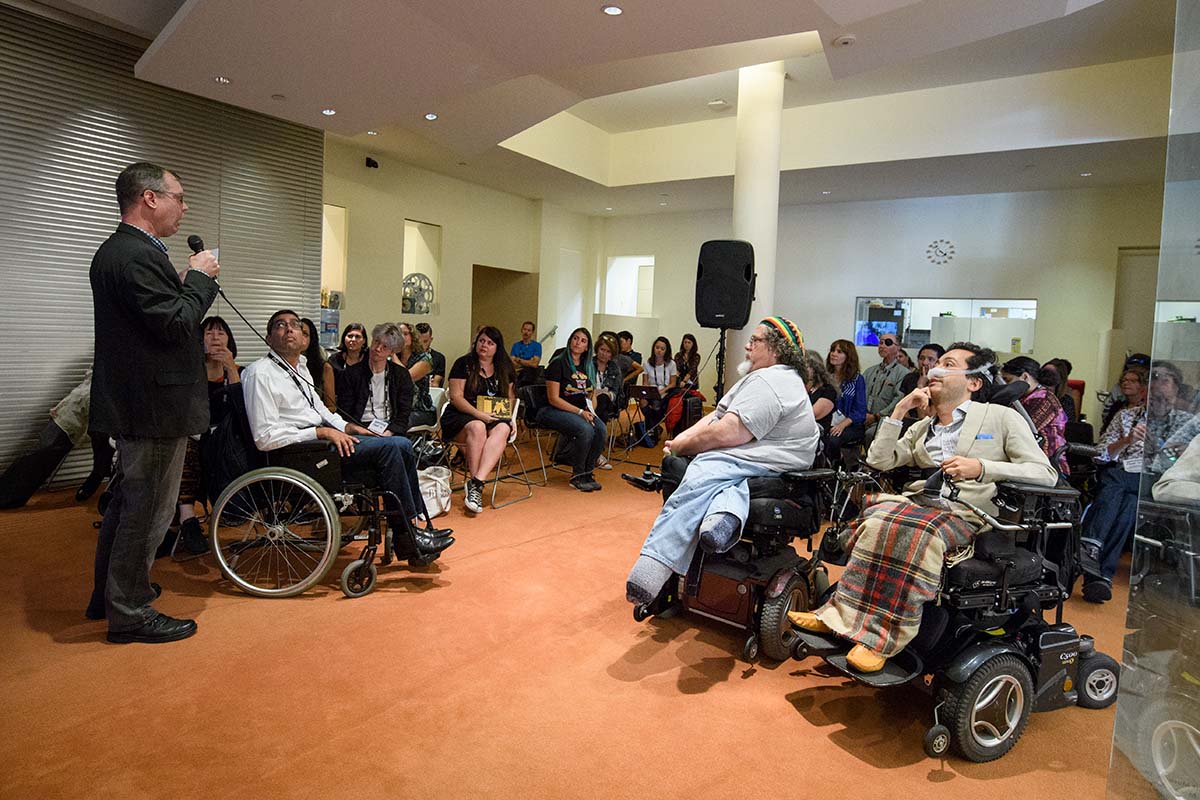
The founding of FWD-Doc (Filmmakers with Disabilities-Documentary) can be traced to IDA’s 2018 Getting Real conference in Los Angeles. After a panel that highlighted the work of several documentary filmmakers with disabilities, about 40 of us, and our allies, went into an adjacent room for what was more than likely the first-of-its-kind get-together. For many of us, it was the first time that we would meet or talk to another filmmaker who had a similar lived experience of having a disability.
A few of us had learned how organizations like A-DOC and Brown Girls Doc Mafia came into being and how they were an important resource for their communities. Out of this awareness and need for our community, FWD-Doc was born.
FWD-Doc has been led by me, Day Al-Mohamed, Lindsey Dryden and Alysa Nahmias. As working filmmakers, we’ve encountered many of the successes, difficulties and discussions about purpose that any new organization has and still faces. How do we build membership? What is our mission? How do we provide services and community? And, not the least, how do we plan so that we can sustain the organization? It is in these questions that we encounter challenges that are more specific to our community and some that are universal.
The D/deaf, disabled and neurodiverse had been overlooked in the past when diversity initiatives, programs or policy statements were issued. Things are a bit better than they were five years ago, but we are still being left out. Many don’t understand that our community is a cultural entity, with its history and accomplished creatives. It is not uncommon for us to see the disabled excluded from the groups that organizations list when promoting their diversity, inclusion and equity efforts. Now the time has come for everyone to add the “A” for access onto DEI.
What our community needs are targeted attempts to find, fund and promote our filmmakers. The same programs that worked for other marginalized communities can be modeled to work with ours. What will be different is how accessible these programs are. That rustic retreat in the woods or that end-of-workshop hike might exclude, rather than embrace, us. In some instances, alternative ways of communicating must be provided, from the most obvious, like sign-language interpreters, to one of the latest frontiers, where funders will accommodate alternative application processes beyond the online form.
The more universal barriers, ones that are not necessarily disability-related, include using endurance or physical ability as a measurement of one’s value to a production. The same long hours that have been the gateway to an entry-level position (or in the case of the recent IATSE streaming contract negotiations) can be as impossible for a single parent or someone who is geographically disadvantaged as it is for someone with diabetes or multiple sclerosis. Add to this the misconceptions and stigma around disability, and we might not get the first meeting.

And like other communities, the disabled have been subject to extractive filmmaking practices. One can understand this by looking at how this has affected other communities, and how important it is for us to be authentic storytellers ourselves. This gives FWD-Doc a sense of urgency.
Whether it be assisting our members in finding work or engaging with other organizations when we co-sponsor mixers and events, this is the kind of work that FWD-Doc does to counter the barriers we face.
On the other hand, there have been some meaningful accomplishments that have been encouraging and—dare I use this word?—inspiring.
Through the efforts of FWD-Doc, in association with Doc Society and Netflix, our “FWD-Doc Toolkit for Inclusion & Accessibility: Changing the Narrative of Disability in Documentary Film” was created. This document has gained traction as a resource for the film industry to include and hire people with disabilities in all aspects of producing authentic, impactful films. Our FWD-Doc Engagement Pack, produced in association with The BFI Doc Society Fund, focuses on the processes filmmakers, funders, buyers and exhibitors (among others) can adopt when working with disabled colleagues and audiences.
We are especially proud to have flagged processes and policies that might have been considered ableist in Sundance Institute’s COVID-19 risk assessment document, “Independent Documentary Filming in the Time of Corona,” which was developed with Doc Society and Field of Vision. Today, we have our sights set on making sure we are a sustainable organization. We’re about to embark on a planning process that will look at short- and long-range goals.
We are inspired by our members. Their films are screening at more and more festivals. As we return to gathering in-person, several of us have attended these festivals and industry social gatherings. FWD-Doc members continue to participate in or lead panels, some of which aren’t necessarily disability-related, which is, unfortunately, an accomplishment that’s worth mentioning. And although we want to see a hybrid world when we get to a possible “post-pandemic” world, where events are still accessible remotely, we look forward to bellying up to the bar with our fellow filmmakers and imagining a world where we’ll lift each other up to tell our urgent and entertaining stories together.
James LeBrecht is a filmmaker, sound designer, and disability rights activist. He is the co-director with Nicole Newnham of the 2020 documentary Crip Camp, which was nominated for an Academy Award for Best Documentary Feature in 2021.




